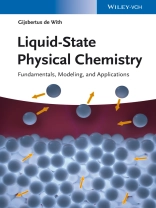For many processes and applications in science and technology a basic knowledge of liquids and solutions is a must. Gaining a better understanding of the behavior and properties of pure liquids and solutions will help to improve many processes and to advance research in many different areas. This book provides a comprehensive, self-contained and integrated survey of this topic and is a must-have for many chemists, chemical engineers and material scientists, ranging from newcomers in the field to more experienced researchers. The author
offers a clear, well-structured didactic approach and provides an overview of the most important types of liquids and solutions. Special topics include chemical reactions, surfaces and phase transitions. Suitable both for introductory as well as intermediate level as more advanced parts are clearly marked. Includes also problems and solutions.
Table des matières
PREFACE
INTRODUCTION
The Importance of Liquids
Solids, Gases, and Liquids
Outline and Approach
Notation
BASIC MACROSCOPIC AND MICROSCOPIC CONCEPTS: THERMODYNAMICS, CLASSICAL, AND QUANTUM MECHANICS
Thermodynamics
Classical Mechanics
Quantum Concepts
Approximate Solutions
BASIC ENERGETICS: INTERMOLECULAR INTERACTIONS
Preliminaries
Electrostatic Interaction
Induction Interaction
Dispersion Interaction
The Total Interaction
Model Potentials
Refinements
The Virial Theorem
DESCRIBING LIQUIDS: PHENOMENOLOGICAL BEHAVIOR
Phase Behavior
Equations of State
Corresponding States
THE TRANSITION FROM MICROSCOPIC TO MACROSCOPIC: STATISTICAL THERMODYNAMICS
Statistical Thermodynamics
Perfect Gases
The Semi-Classical Approximation
A Few General Aspects
Internal Contributions
Real Gases
DESCRIBING LIQUIDS: STRUCTURE AND ENERGETICS
The Structure of Solids
The Meaning of Structure for Liquids
The Experimental Determination of g(r)
The Structure of Liquids
Energetics
The Potential of Mean Force
MODELING THE STRUCTURE OF LIQUIDS: THE INTEGRAL EQUATION APPROACH
The Vital Role of the Correlation Function
Integral Equations
Hard-Sphere Results
Perturbation Theory
Molecular Fluids
Final Remarks
MODELING THE STRUCTURE OF LIQUIDS: THE PHYSICAL MODEL APPROACH
Preliminaries
Cell Models
Hole Models
Significant Liquid Structures
Scaled-Particle Theory
MODELING THE STRUCTURE OF LIQUIDS: THE SIMULATION APPROACH
Preliminaries
Molecular Dynamics
The Monte Carlo Method
An Example: Ammonia
DESCRIBING THE BEHAVIOR OF LIQUIDS: POLAR LIQUIDS
Basic Aspects
Towards a Microscopic Interpretation
Dielectric Behavior of Gases
Dielectric Behavior of Liquids
Water
MIXING LIQUIDS: MOLECULAR SOLUTIONS
Basic Aspects
Ideal and Real Solutions
Colligative Properties
Ideal Behavior in Statistical Terms
The Regular Solution Model
A Slightly Different Approach
The Activity Coefficient for Other Composition Measures
Empirical Improvements
Theoretical Improvements
MIXING LIQUIDS: IONIC SOLUTIONS
Ions in Solution
The Born Model and Some Extensions
Hydration Structure
Strong and Weak Electrolytes
Debye – Hückel Theory
Structure and Thermodynamics
Conductivity
Conductivity Continued
Final Remarks
MIXING LIQUIDS: POLYMERIC SOLUTIONS
Polymer Configurations
Real Chains in Solution
The Florry – Huggins Model
Solubility Theory
Eo S Theories
The SAFT Approach
SOME SPECIAL TOPICS: REACTIONS IN SOLUTIONS
Kinetics Basics
Transition State Theory
Solvent Effects
Diffusion Control
Reaction Control
Neutral Molecules
Ionic Solutions
Final Remarks
SOME SPECIAL TOPICS: SURFACES OF LIQUIDS AND SOLUTIONS
Thermodynamics of Surfaces
One-Component Liquid Surfaces
Gradient Theory
Two-Component Liquid Surfaces
Statistics of Adsorption
Characteristic Adsorption Behavior
Final Remarks
SOME SPECIAL TOPICS: PHASE TRANSITIONS
Some General Considerations
Discontinuous Transitions
Continuous Transitions and the Critical Point
Scaling
Renormalization
Final Remarks
APPENDIX A UNITS, PHYSICAL CONSTANTS, AND CONVERSION FACTORS
Basic and Derived SI Units
Physical Constants
Conversion Factors for Non-SI Units
Prefixes
Greek Alphabet
Standard Values
APPENDIX B SOME USEFUL MATHEMATICS
Symbols and Conventions
Partial Derivatives
Composite, Implicit, and Homogeneous Functions
Extremes and Lagrange Multipliers
Legendre Transforms
Matrices and Determinants
Change of Variables
Scalars, Vectors, and Tensors
Tensor Analysis
Calculus of Variations
Gamma Function
Dirac and Heaviside Function
Laplace and Fourier Transforms
Some Useful Integrals and Expansions
APPENDIX C THE LATTICE GAS MODEL
The Lattice Gas Model
The Zeroth Approximation or Mean Field Solution
The First Approximation or Quasi-Chemical Solution
Final Remarks
APPENDIX D ELEMENTS OF ELECTROSTATICS
Coulomb, Gauss, Poisson, and Laplace
A Dielectric Sphere in a Dielectric Matrix
A Dipole in a Spherical Cavity
APPENDIX E DATA
APPEN
A propos de l’auteur
Gijsbertus de With is full professor in materials science. He graduated from Utrecht State University and received his Ph D in 1977 from the University of Twente on the ‘Structure and charge distribution of molecular crystals’. In the same year he joined Philips Research Laboratories, Eindhoven. In 1985 he was appointed part-time professor and in 1996 he became full professor at the Eindhoven University of Technology. Since 2006 he is also chairman of the Soft Matter Cryo TEM Research Unit. His research interests cover structural and interfacial phenomena in relation to the processing and behavior of multi-phase materials. He has (co)-authored more than 250 research papers and holds about 20 patents. He is a member of the Advisory board of the J. Eur. Ceram. Soc. and is presently co-organizer of the annual Coatings Science International conferences. In 2006 his two-volume monograph Structure, Deformation, and Integrity of Materials was published.











